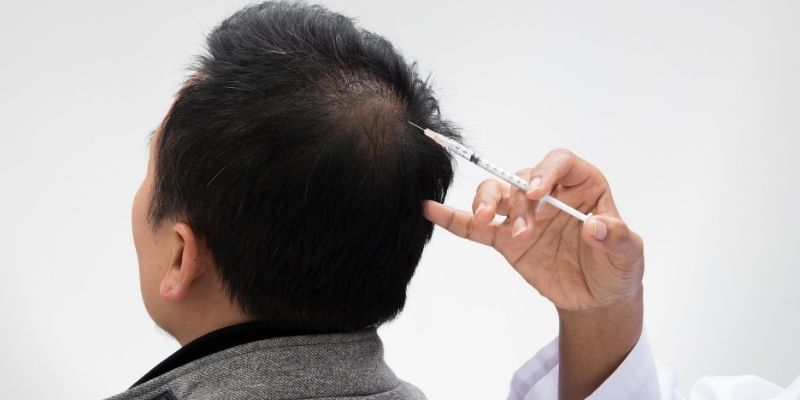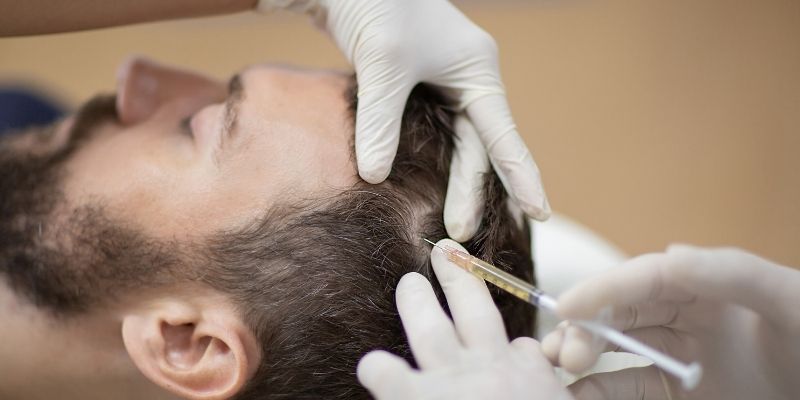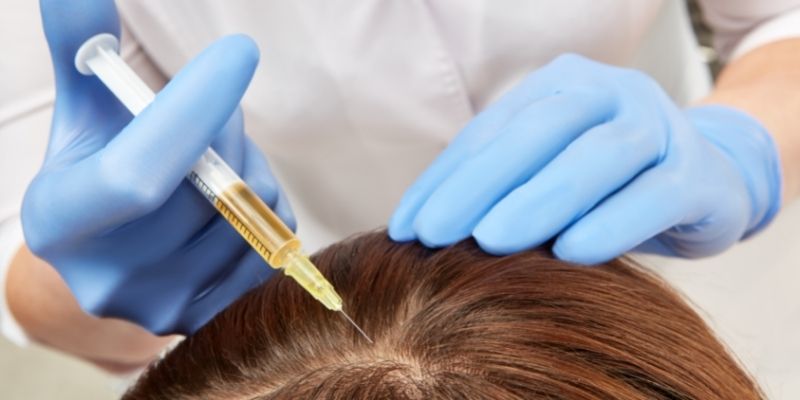Medications Or Drugs That Can Cause Hair Loss
Medications, or drugs, are formulated to relieve us from many ailments. However, it is often seen that many drugs possess side effects that can become annoying or at times, even life threatening. One such side effect is drug induced hair loss. An increase in hair fall and hair thinning are often seen with the usage of many medications. This can be resolved if detected early.
Can Drugs Make Your Hair To Fall Out?
Drugs can affect the hair growth cycle at different stages and induce hair loss as a side effect. As we know already, the hair growth cycle consists of three stages – Anagen, Telogen, and Catagen. During the anagen phase, the hair grows actively for two to four years. After this, the hair strand enters the resting phase, which is known as the telogen phase, for three to four months. At the end of this phase, the hair enters catagen phase and sheds from the root. It is eventually replaced by a new hair strand. When it comes hair loss due to drugs, these medications can affect the hair growth cycle in either the anagen phase or in the telogen phase.
- When the hair starts to fall in great numbers in a couple of days to few weeks after taking the medication, the type of hair loss seen is called Anagen Effluvium. The drugs affect the development of matrix cells in the hair follicles that are responsible for producing hair.
- The type of hair loss that is most commonly seen with medications is actually Telogen Effluvium, where in the intake of that particular medication forces the hair to enter telogen phase and fall eventually in a few months.
Either ways, the drugs that you take to treat different conditions, can impact the hair growth cycle in different stages and result in increased hair fall.
Must Read: Top 15 Causes Of Hair Loss In Men & Women
How To Tell If Your Medication Is Causing Hair Loss?
Some medicines cause notable hair thinning and hair loss. Just like while undergoing chemotherapy, hair loss is common. If your doctor has advised you to undergo chemotherapy, it is best to prepare yourself mentally for the hair loss.
For the other medications, pay attention to when the hair loss began and if you began taking any new medications in the last few months. Do not experiment on yourself to find out which medication may be causing the hair loss. This can have drastic effects on your existing disease for which you are essentially taking the said medications. Consult your doctor and inform him/her about the increase in hair loss and hair thinning. The doctor can clarify if the medication you have been prescribed has hair loss listed as a side effect or not. In the case of multiple drugs, he/she can advise you about the course to follow to identify the potential drug that is causing the hair loss.
Can Antibiotics Cause Hair Loss?
Hair loss due to antibiotics is not common but it does occur. Some non-specific antibiotics kill bacteria in various areas of the body and can lead to vitamin B deficiency. This, in turn, causes hair loss.
Drugs/Medications That Cause Hair Loss
Alopecia, also known as hair loss, can occur as a result of taking some medications.
- Drugs used in chemotherapy like methotrexate, tamoxifen, paclitaxel, cyclophosphamide, doxorubicin, etc.
- Antidepressants like amoxapine, desipramine, sertraline hydrochloride, fluotexine hydrochloride, etc.
- Anti-inflammatory drugs and NSAIDs (non-steroidal anti-inflammatory drugs) such as anaprox and clinoril.
- ACE inhibitors used to treat blood pressure.
- With birth control pills, hair loss is also commonly seen as they can create a hormonal imbalance.
- Anticonvulsants or anti-seizure medications.
- Beta blockers used to lower the load on your heart and reduce blood pressure.
- Antifungal drugs such ketoconazole.
- Antibiotics of certain types and immune system suppressors.
- Anticoagulants such as warfarin sodium and heparin injections.
- Male hormones in the form of testosterone and anabolic steroids.
- Cholesterol reducing drugs.
- Drugs used for weight loss.
- Over the counter and prescription medicines used to treat stomach ulcers and indigestion.
Note: The above list of drugs and medical conditions may have several other side-effects and hair loss is just one of them. But the effects of these drugs may manifest differently based on individual health conditions and other factors. But if you see dramatic hair loss, then it is recommended to check with your healthcare provider, as only clinical diagnosis may confirm the correlation.
Does Medication Causing Hair Loss Be Avoided?
Yes, you can avoid such medications by checking with your doctor if any of the drugs prescribed to you have hair loss as a potential side effect. If they do, you can ask your doctor to suggest other medications that can substitute your current prescription. If not, you can consult a dermatologist/trichologist for recommendations to keep the hair loss under control.
Must Read: How To Effectively Prevent Hair Fall In Men & Women?
How To Stop The Hair Loss Caused By Medications?
- For some drugs, which cause telogen effluvium, your doctor can prescribe some alternate medications which do not list hair loss as a side effect. In many cases, the prescription is not life-long and the hair growth cycle is restored in two to three months after you stop ingesting the drugs.
- If you are looking for methotrexate hair loss treatment, tamoxifen hair thinning treatment or any other chemotherapy drug related hair loss treatment, then the hair growth can only be seen a few months after the treatment has stopped. And this hair growth often happens naturally.
Treatments To Help Regrow Your Hair
- Platelet rich plasma treatment – PRP treatment is a widely popular treatment to treat hair loss caused due to multiple reasons, including hair loss due to drugs. Once your primary physician has given you the permission, you can consult a dermatologist to see if PRP is a suitable option for your hair loss concerns.
The procedure is fairly simple and involves extraction of a tiny amount of your blood. The platelets are separated from this, activated, and injected into your scalp. This ensures direct delivery of important and essential growth factors to the hair matrix cells. Hair growth rate and hair thickness increases after just a few sessions. This treatment possesses no side effects and has absolutely no downtime associated with it.
- Minoxidil & Finasteride – In some cases, when the hair growth has not been restored even after discontinuing the medication for two to three months, a dermatologist may recommend you to use either minoxidil or finasteride on the affected areas on the scalp. The usage of these topical medications reduces hair fall and improves hair growth. Finasteride can only be used by men, whereas minoxidil can be used by both men and women.
Must Read: PRP vs Hair Transplantation vs Mesotherapy vs Stem Cell vs Laser
FAQs
- Does Cholesterol Medicine Cause Hair Loss?
Certain types of medications, namely atorvastatin and simvastatin, which are used to lower cholesterol levels in the body cause hair loss as a side effect. The newer versions of cholesterol medications are better options as they do not cause hair loss. - Can Metoprolol Cause Hair Loss?
Yes, it can cause hair loss as a side effect. Metoprolol is a beta blocker drug used to treat blood pressure and take away excess stress that the heart may be experiencing. - Can We Prevent Hair Loss Caused By Chemotherapy?
Cooling caps and devices are used for the scalp in some cases to slow down the blood flow to the hair follicles and hence, cause lesser amounts of the chemotherapy drugs from reaching the scalp. Such instruments may help to reduce the extent of hair loss, but are not fool-proof methods. Additionally, the possibility of the cancer relapsing in the head region exists when such methods are used to prevent hair loss caused by chemotherapy. Your oncologist can help you to decide if cooling caps can be used in your case or not.
Must Read: Is There A Permanent Cure For Hair Loss?
Drug induced hair loss is a common concern with many people having to take prescription medications to treat different ailments. If you suspect your hair loss could be due to a medication you take on a regular basis, discuss your concern with your doctor and a dermatologist to obtain the best advice for its treatment.









